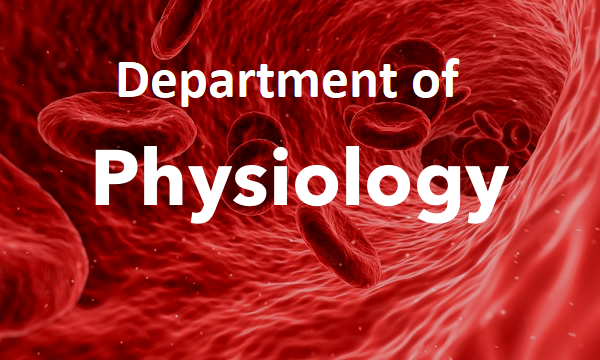


Department of physiology, Dr.S.C. government medical college was established in 1988.
Human physiology is a science of the mechanical, physical and biochemical function of humans and serves as foundation of modern medicine as a discipline. It connects science , medicine and health and creates a framework for understanding how the human body adapts to stresses, physical activity and disease.
Department of physiology provides rigorous but flexible undergraduate curriculum and engaging learning environment to help our students to reach their goals.
We develop self directed learning, problem solving attitude and analytical skills in the students and also increase competency of forthcoming health professionals.
We believe that value of degree in human physiology is that it prepares students to be critical thinkers who can come to independent rational conclusion regarding their own personal health and who can use the guiding principle of scientific thinking and enquiring as a model for understanding the world around them.
We think our students are qualifying with the best education available in the field of human physiology and that they are well prepared for future learning opportunities.
To equip the students in the discipline of Human Physiology with knowledge and understanding of structure and function of human and biological systems. Thus, to foster the development of professional skills through well designed curriculum; based on experiments, training and research.
Physiology is teaching the subject through advanced teaching program supported by appropriate and internationally recognized research activities carried out by suitable, qualified, dedicated and motivated teachers.
In this department training is given to Undergraduate students regarding
a. the functions of each organ system of the body,
b. the mechanisms by which each organ functions,
c. the interrelations of the organ systems to each other,
d. the integrated responses of the organ systems of the body to physiological and pathological stresses,
e. the pathophysiology of common diseases related to the organ systems of the body.
These trainings are given in the form of lectures, practical, experiments, seminars and tutorials.
As per the Indian Medical Council guidelines, admission are given for two MD seats every year. So, total six post graduate students are working in the department each year. All the PG students are provided training in the form of lectures, practical, group discussion, seminars, microteaching and journal readings. During the three years of postgraduate training a PG student has to submit Dissertation and one published Research paper compulsorily as per the guidelines of MUHS.
• To introduce the students to the Physiological concepts of homeostasis and control mechanisms.
• To understand the role of molecules, cells, tissues, organs, and organ systems in human health and disease.
• To study the functions of body systems- with emphasis on clinical relevance.
• To understand the physiology and basic regulatory concepts of the organ systems and the mechanisms that allow the body to carry out those functions
• To demonstrate a mechanistic (how) and teleologic (why) understanding of the levels of organization comprising the human organism.
• To integrate the knowledge of the major systems to outline how these systems interact to maintain homeostasis.
• To demonstrate the use of the scientific method and quantitative reasoning to field of physiology.
• To develop critical thinking skills in order to be able to think like a physiologist and solve physiologically-relevant problems
Department of physiology is having following divisions in it:
It is having 96 textbooks and reference books with all latest editions of book.
The departmental museum has banners,models, posters, charts, graphs catalogues available for undergraduate and postgraduate teaching and training.
Amphibian experiments are carried out by under graduate and post graduate students as part of their teaching and training. Various cardiac and skeletal graphs and charts are available.
With all the facilities of Electric microscope (40), Normal light microscope (30), the undergraduate and post graduate students carry out the haematological practicals by themselves.
RBC count, WBC count, DLC, Haemoglobin percentage, Bleeding time, Clotting time, Determination of blood groups.
Platelet count, Reticulocyte count, Sperm count, Osmotic fragility of blood.
Hematological platelets count, reticulocyte count, determination of ESR,PCV,Anemia and blood indices are carried out in seminar room.
Various preliminary objective of clinical examination are taught in this for under graduates and post graduates:
Clinical examination of arterial pulse and JVP, determination of arterial blood pressure.
Clinical examination of RS, CVS, Alimentary system and abdomen,CNS examination of CNS in following headings:
All post graduate students present weekly seminars on the listed important topics of Physiology and latest Journal clubs on the topics related as part of their teaching and training.
All undergraduates and post graduates have to maintain daily record of their activities in the form of Log book and Journal as part of their curriculum.
Electrocardiogram, Spirometer,Mosso’sergograph, Perimeter, cardiopulmonary efficiency test, Reaction time and hence forth.